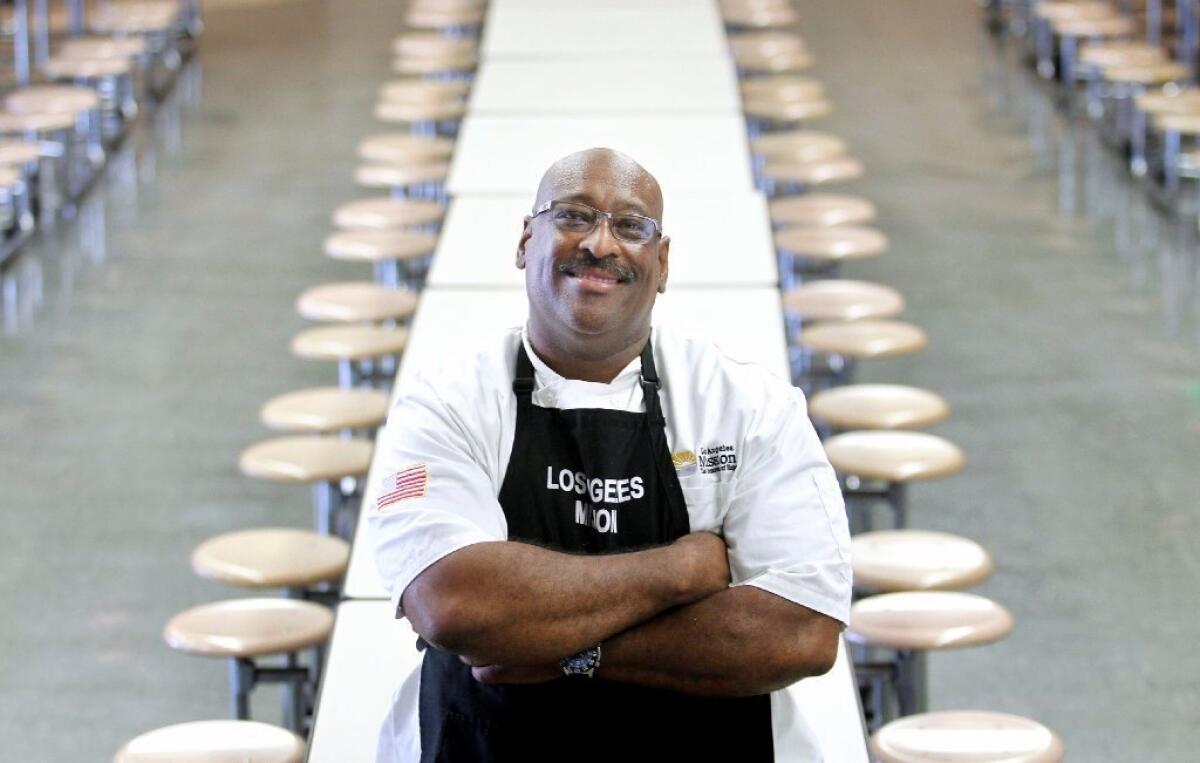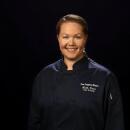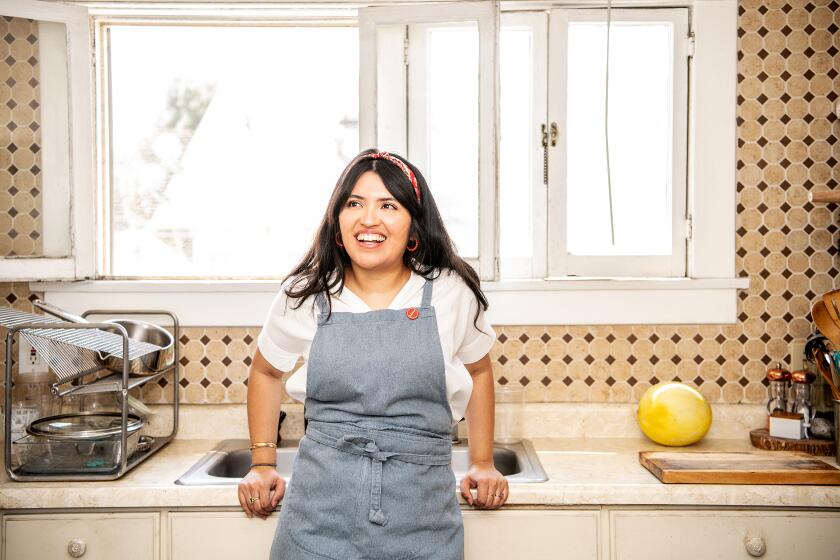Q&A: Kitchen talk with chef Chris Cormier of the Los Angeles Mission

- Share via
Chef Chris Cormier has overseen countless meals served during his 16 years with the Los Angeles Mission, located in the heart of downtown. Perhaps best known for its annual Thanksgiving event, a star-studded affair with well-known chefs and a flood of volunteers, the Mission is also a day-to-day operation, serving two breakfasts, three lunches and three dinners each day.
As director of food services, Cormier supervises an operation that serves 1,200 to 1,800 meals daily. Cormier sat down on a recent morning to talk about his work and the Mission’s annual Easter event, which will be held this Friday.
What inspired you to get into cooking?
Well, my last name is Cormier. It’s Creole. So my family knew how to cook, and I love cooking. My family would tell me, “Do this. Do this.” And so I’d learn. Growing up, with my friends, we’d have little cooking competitions.
Later I did an apprenticeship with three chefs and it was a great experience. At first I thought they wanted me out. One chef, I finally asked him, “Are you trying to get me to drop out?” And he said, “No, I see more potential in you.”
He was pushing you.
Yeah, he was pushing me. And I told him [laughs], “You could have just told me.”
Was this at a school or at a restaurant?
It was at a training facility. It doesn’t exist anymore. But I had the time of my life there. I learned cooking en masse, and cooking in small quantities.
One of my things with cooking — whether at home or in the industry — is there’s always evolution and change. So you have to stay on top, you know. And that’s also the beauty — you don’t just stay still.
How did you end up cooking at the L.A. Mission?
Unfortunately, many, many years ago I was down here [during hard times] — I was stuck. And you know, I didn’t even want to go in the kitchen: I was skilled in a couple of other areas. But then you get to a certain age where you have to decide what you want to do. I had to go, “All right. All right, God. Do I want to work in a kitchen? Do I want to do this?”
So you started cooking at other mission kitchens before ending up here, where you worked your way up.
As a younger man, you can do the grill work and the fryer work and all that. And then you get into management and directing.
[Sighs] Unfortunately, I know people, and it can be — you have to have a heart, and a passion to work down here. Because it can be depressing. But it’s wonderful to put a smile on somebody’s face.
Seeing that smile motivates you?
Well, I’d say first of all seeing the outcome with people. Seeing the change in people that are here. That’s number one. Seeing the change in them. And they help me. Sometimes I go home, and I’m tired. And then I go — I need to practice what I’m preaching.
Your Easter event is coming up. When do you start planning and what are you serving for the big meal?
We started planning two weeks ago; we start working a week before. We’ll have the ham coming in.
We’re serving smoked ham, and we have a ginger and marmalade glaze. We have fresh broccoli and cauliflower that one of our vendors said, “Well, I’ll donate half of that.” We got a good deal on the ham. And we also have macaroni and cheese that we’ll make in-house, with smoked bacon bits. Oh, and pecan pie. Somebody’s donating the pecan pies and the dinner rolls.
How many are you planning to serve?
We always plan for 3,000. We’ll probably hit that mark.
How many pounds of ham?
I ordered 2,500 pounds. It’s a day we let people eat. We don’t let people gorge themselves; we don’t do that.
You mention vendors and donations. How is the mission supported? Where do you get your food?
The mission is mainly supported by private donations, whether somebody gives us a grant or somebody mails us five dollars — we put it all together. We also utilize our networking using food banks, people who donate food, or who we partner with like UCLA. Once a year UCLA will finish their semester and donate everything in their kitchen to us. And, it’s like, fantastic stuff.
Then we have a variety of vendors we utilize to purchase some stuff because we can’t just sit and wait. And so we get our staples. Some vendors also donate. Just the other day, one vendor said, “Hey. I’ve got a pallet of turkey pastrami. It’s perfectly good. You want it?” It’ll help to feed so many people.
We try and network with the other missions — they’re doing the same work we’re doing. But in this kitchen we pump out a lot.
What about volunteers? The mission seems to have so much help for events like Thanksgiving.
We do get a lot of volunteers. We work with Roy Choi, Michael Voltaggio and Ben Ford and a few others. They all work and come together with a meal for our events. Easter is still one of the important events, but it’s not the same thing as Christmas or Thanksgiving. A lot of people come because they’re star-struck.
But, it’s like, we’re here seven days a week. Overall, we have some die-hard volunteers that stick it out; they’re almost like staff they’re here so much. People, in their heart, they find that time to give.
You train students that come through the mission. I imagine the mentoring goes beyond just cooking skills.
Yeah. And you know, when they come here they touch upon each area around the mission. If somebody says, “I want to learn in the kitchen,” then we’ll accommodate them. It’s me and another part-timer, and pretty much the rest are all students. And some come in with minimal skills. And some come in with no skills.
And you’re constantly training. Those that really want to learn, we’ll take them on the side and say, “Hey, come on.” And teach them. The fun part is when they come back and say, “I’m at the Double-Tree now.” And we’ll say, “Hey! How’d you get that job.” And they say, “You showed me.”
I was taught the same way. I would say, “What can I do? How can I repay you?” And [my mentors] would say, “Pass it on to the next person. Keep it going and going.”
[With students] we’ll say, “This is what we require of you. You’ve got to be on point.” And we’ll push them a little bit and bring them along, along with their other studies and the other classes that they have here. But they respond quite well. The ones that maybe have some low self-esteem, it builds them up to be a part of something. Come here and lay out a game plan and have them buy into it, and get the job done. And seeing that change, seeing them succeed, it’s wonderful. It’s beautiful.
Some of these students also go out into the field to intern.
Roy Choi has taken on a few. Ben Ford has taken on a few. And I tell the students this is an apprenticeship. If you think I’m tough, I don’t care if you go to the Hilton or the Hyatt — the chef is not playing.
What goes into planning the daily meals?
That’s the fun part of the job! This month I’m on a Thai kick. Next month, I’m on my Italian kick. I like to go around and try new things. The majority are hits, but sometimes it’s hit or miss. We do, you know, Thai chicken salad, red curry, panang, stir-fry, Sichuan, Italian meals. You name it, we do it.
For those that are trying to watch their diet, we try to keep that in mind. We do diabetic lunches — you have to be responsible with what you choose, but at least we offer it, and it goes over quite well. We have a salad bar. We have guys that work, two persons assigned to the salad bar. A green salad, toppings, pasta. We always offer fresh fruit.
We don’t heat lamp food or hold food, or leave food in holding cabinets for hours. I don’t believe in that. Or setting food out and just leaving it. I tell them, “Pretend you’re serving your mom at a restaurant. Make it fresh! Present it fresh!”
Years and years ago when I started doing this, I worked under another guy. He says, “We are who we are. I don’t care if you give them a hot dog or oatmeal. Pretend your grandmother’s coming, or your mother’s coming to dinner, and this is all you have. But you’re going to make it good.”
And so if you treat people, you know, it starts with a meal, and it touches somebody’s heart. It changes them. It changed my life.
You can find more information about the Los Angeles Mission, including how to make a donations and get involved, at the mission’s website.
Love cooking as much as I do? Follow me @noellecarter
More to Read
Eat your way across L.A.
Get our weekly Tasting Notes newsletter for reviews, news and more.
You may occasionally receive promotional content from the Los Angeles Times.











